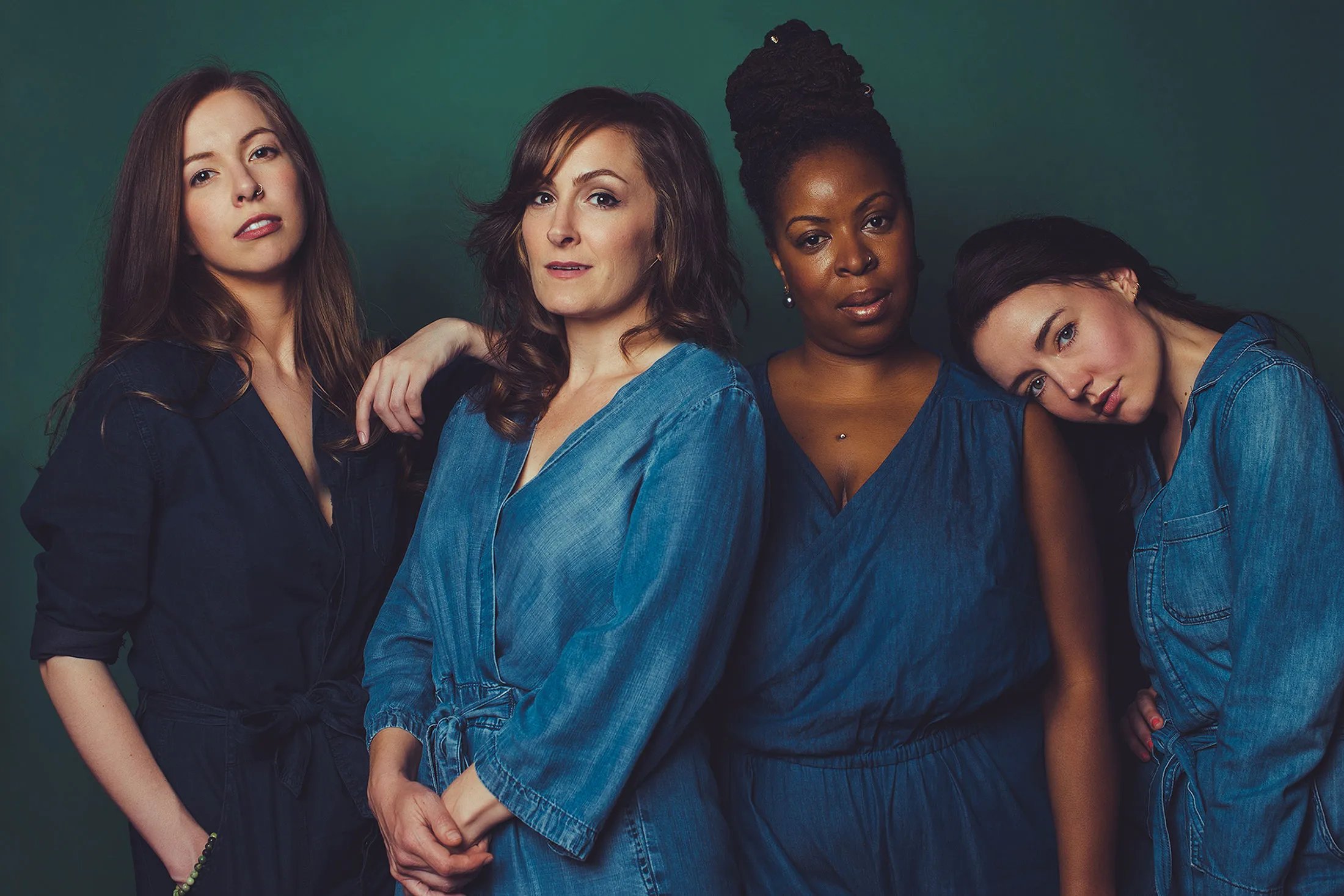Click Image to Download!
When a jazz ensemble earns a GRAMMY Award® nomination with its very first song, something unusual is in the works. In the case of säje, it’s a rare example of the sound of the future finding the right ears at its inception. An unprecedented collaboration that brings together four women creators who are all composer/arrangers, vocalists, and entrepreneurs with impressive individual careers, säje has emerged as a singular communion unlike any other group on the scene.
Featuring Los Angeles-based Sara Gazarek and Erin Bentlage and Seattle-situated Johnaye Kendrick and Amanda Taylor, säje (rhymes with beige) is closer in spirit to collective instrumental ensembles than jazz vocal combos. Encompassing finely wrought originals, reimagined jazz standards and inventive interpretations of contemporary tunes by the likes of Björk, The Bad Plus, and YEBBA, säje exists in a space without sonic or genre boundaries, coaxing the vocal ensemble into new sonic territory. The group’s eponymous debut album is a striking achievement, from the shimmering harmonies of the GRAMMY®-nominated opening track “Desert Song” to the gorgeous closing medley of British singer/songwriter Michael Kiwanuka’s “Solid Ground” and Lennon and McCartney’s “Blackbird.”
These are not women who grew up singing together. They bring disparate experience, influences, and career paths to the collective, and are all equally invested in its creative evolution. It’s not a question of säje being more than the sum of its parts. Rather, the group has become a vehicle expressing their deepest musical selves, even as it takes them into unexpected realms. The fact that they’re keeping company with fellow vocal explorers such as Jacob Collier and Michael Mayo and a cadre of era-defining players, including trumpeter Ambrose Akinmusire, drummer and NEA Jazz Master Terri Lyne Carrington, tenor saxophonist Daniel Rotem, bassist Ben Williams and pianists Dawn Clement and Gerald Clayton, speaks to the group’s questing mission.
For vocalist and instrumentalist alike the music requires a creative vision encompassing jazz improvisational imperative and the lapidary arrangements of chamber pop. It’s a rarified skillset and "there are only a handful of people in my circle who have come up through the jazz scene and identify as improvisers, yet who are also wholly satisfied by the structure of the written thing,” Gazarek says. “While there is a certain amount of interplay, we’re not improvising the arrangements. There are set voicings. We’re really invested in the improvisational aspect, but I know for a few of us, it has been a new challenge to also put on the accompanist hat and serve the arrangement. But that’s really where a new layer of magic happens.”
Magic is a word that comes up often when the women of säje talk about the group’s founding and evolution. The story of “Desert Song,” their first single, has already attained near legendary status. Building on various degrees of friendship and acquaintance, the foursome arranged a Palm Springs weekend retreat to experiment with writing and producing music together. Not much composing was done, but the women forged much closer bonds that manifested in the creation of “Desert Song.” For Johnaye Kendrick, initial reluctance to share her creative process ended up giving way to a shocking reassessment of her own creative needs.
“From the beginning we were very vulnerable, discussing personal life experiences that informed who we were,” Kendrick says.“That level of vulnerability in a collaborative process was new and uncomfortable for me, in fact I was quite resistant. But the second session we wrote ‘Desert Song,’ and I had the strong feeling something important and magical was happening.”
The creative frisson of the collaboration sparked again in January 2020 when the opportunity to make their performance debut at the Jazz Education Network Conference in New Orleans led the women to quickly create an entire set of new material. “We knew it would be some kind of vocal harmony based thing,” Erin Bentlage recalls. “What if we did the vocal jazz arranging thing, but something authentic to us, not for fulfilling the traditional sound? I do a lot of arranging, this has felt so expansive because of what we’re not willing to default to.”
The ecstatic reception in New Orleans led to a busy run of performances at festivals and major clubs that winter, momentum that ground to an immediate halt with the advent of Covid. News that “Desert Song” earned a GRAMMY nomination in the “Best Arrangement Instruments and Vocals” category provided a burst of light during lockdown’s darkness and uncertainty, as did winning the John Lennon Songwriting Contest Grand Prize Award for their second composition, “Wisteria.” A 2021 nomination for “Best Vocal Jazz Group” in the Jazz Journalists Association Awards didn’t hurt either. The upcoming debut album brings this extraordinary ensemble into the international spotlight, opening up sonic and emotional terrain that is sure to be followed by other singers.
“Having sung in a lot of groups I never knew there could be such intimacy and depth or that I would experience it,” Amanda Taylor says. “I’m excited for all the groups that will be birthed because of our albums. Everyone deserves this experience.”
A glimpse at the accomplishments of the women in säje and their singular chemistry starts to make sense. Erin Bentlage has been featured on albums by Jacob Collier (Djesse Vol. 3), Kiefer (When There’s Love Around), Kate McGarry (What To Wear In The Dark), and Amber Navran (their collaboration Golden Light). On faculty at California State University, Northridge, she teaches classes on voice, musicianship, jazz, improvisation, and composition. As a studio vocalist she’s contributed to a wide variety of projects, from film scores to singing (and often writing) background vocals for artists such as Pomplamoose and Moonchild. In 2020, the Los Angeles Jazz Society commissioned Bentlage to create a 20-minute original work as part of the New Note project.
A Grammy-nominated arranger known for her work with leading vocal ensembles, including Groove for Thought, The Manhattan Transfer, Chanticleer, and Kings Return, Amanda Taylor is an in-demand teacher and clinician at schools around the country. Known for writing accessible and inventive arrangements for young jazz ensembles via her vocal arranging company Wicked Pigeon, she’s an active composer/arranger and studio singer whose work can be heard on World of Warcraft, Diablo III, Destiny, Shadow of Mordor, and DOTA, among other games.
A graduate of the elite Thelonious Monk Institute, Johnaye Kendrick has honed a deep repertoire of originals and inventively arranged standards, jazz tunes and contemporary pop songs, often accompanying herself on harmonium, violin, viola and percussion. She’s released two albums on her record label johnygirl, 2014’s Here, which features her emotionally charged originals, and 2018’s acclaimed Flying. A 2019 Artist Trust Fellow, a recipient of the Chamber Music America 2020 Performance Plus Grant, and the Marble House Residency, Kendrick is a music professor at Seattle’s Cornish College of the Arts. In addition to her many musical endeavors, she’s a certified Sound Therapy practitioner and Energy Healer with a blossoming practice, johnygirl sound therapy & healing arts studio.
A two-time Grammy nominee for her solo albums, Sara Gazarek has pulled off the treacherous feat of living up to the buzz generated by her John Clayton-produced 2005 debut album Yours. An internationally touring artist with eight albums to her credit, she’s collaborated with heavyweights such as Kurt Elling, Fred Hersch, Billy Childs, and Larry Goldings. Currently serving as governor of the LA Chapter of the Recording Academy, and a recently appointed Associate Professor in the Eastman School of Music’s developing Vocal Jazz Program, Gazarek is widely considered one of her generation’s definitive jazz vocalists.
Attracting attention and support before the release of their debut album, säje recently received support for their continued work through the Chamber Music of America New Jazz Works grant, the Super Patron Grant, the Jazz Road Creative Residencies grant, and the USC Visions + Voices grant. In a business that has often short-changed the artists upon which it’s built, these women have confidently seized control of their own destiny. Creatively ambitious on and off stage, they’re creating a new paradigm, writing and arranging the tunes, calling the shots, and reaping the rewards.
“The sky is the limit,” Gazarek says. “We just want the music of säje to reach as many people as possible. Yes, we’re a four-woman musical machine: we have our five-year plan, the second album is already in the works, along with a list of songs and collaborators we'd like to work with, including Maria Schneider, Björk, Vince Mendoza, Laura Mvula. But we just want to create the music that moves us – without fear or limitations, boundaries or glass ceilings. And hopefully, in the process, we might inspire the next generation of creators to do the same.”







